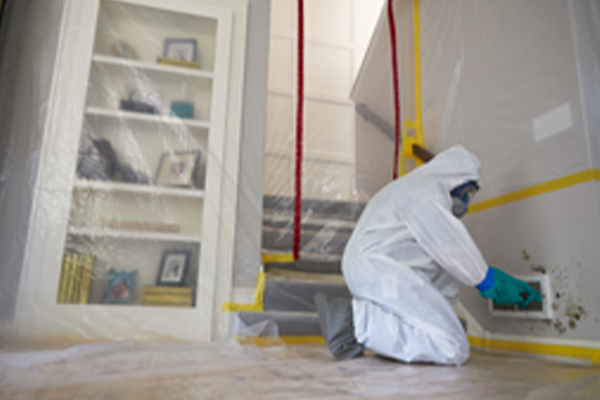Do you see black stuff clinging to your walls and ceilings? Does it have a musty smell? Chances are you’re dealing with black mold. Not only does black mold tarnish your property’s interior, but this slimy stuff is also a health risk for your family. It contains tiny spores that can trigger asthma and allergies and irritate the eyes, nose, throat, and skin. ServiceMaster of Greater Pittsburgh will discuss black mold to uncover how it originates and which areas are most vulnerable. We’ll also review effective strategies for mold remediation in Pittsburgh.
Conditions for Black Mold Growth | Mold Remediation in Pittsburgh
Moisture
Moisture is a catalyst for black mold growth. It creates an ideal environment for spores to thrive, rapidly colonizing surfaces like walls and ceilings—continuous dampness fuels mold development, whether from leaks, humidity, or water damage. Controlling moisture through proper ventilation and addressing leaks promptly is crucial in preventing and combating black mold infestations.
Poor Ventilation
Poorly ventilated areas provide ideal conditions for mold growth. Poor ventilation causes the air to remain stagnant, allowing the mold to remain unbothered and grow in size. Identifying these areas and keeping ventilation in check is essential to reduce mold growth chances.
Areas Most Vulnerable to Black Mold Growth
Black mold tends to flourish in areas with high moisture levels. Bathrooms are particularly susceptible due to constant water exposure. Kitchens, especially around sinks and under appliances, are also at risk. Basements, where dampness can be an issue, and poorly ventilated attics provide suitable conditions. Any space with leaks, condensation, or inadequate ventilation becomes a prime breeding ground for black mold, emphasizing the importance of addressing these vulnerabilities to prevent its growth.
Strategies for Mold Remediation in Pittsburgh
Early Mold Growth Detection
To keep black mold at bay, detecting it early is crucial. One way of doing so is through proper home inspection for any signs of decay. Mold can have a musty odor and cause discoloration on walls and ceilings. Get in touch with a specialist for black mold cleanup immediately.
Keeping Humidity and Ventilation in Check | Mold Remediation in Pittsburgh
Another way to stop black mold spread is by changing the home’s internal environment. By that; we mean ensuring your interior is dry and well-ventilated. You could use dehumidifiers and exhaust fans in humid areas to ensure proper ventilation and humidity. Consult with a professional for black mold cleanup and remediation.
Calling a Specialist in Mold Remediation in Pittsburgh
Although DIY black mold cleanup is an option, due to health risks, a mold remediation specialist in Pittsburgh is a better decision. These experts have more experience in dealing with mold. Apart from removal, they may also fix the issue from the source to prevent them from spreading.
Conclusion
In conclusion, black mold presents a health risk, so mold removal is crucial. Mold growth occurs from moisture and poor ventilation, so keep both in check. Utilize exhaust and dehumidifiers in mold-vulnerable spots. Most importantly, consider the aid of a mold remediation specialist to prevent future mold growth.
Get Quality Mold Remediation in Pittsburgh from ServiceMaster of Greater Pittsburgh
Has black mold invaded your Pittsburgh property? Contact ServiceMaster of Greater Pittsburgh for expert mold remediation in Pittsburgh. Our experts know how to deal with this nuisance to keep your property mold-free. Don’t wait for the problem to worsen; contact us to ensure your family’s safety.

